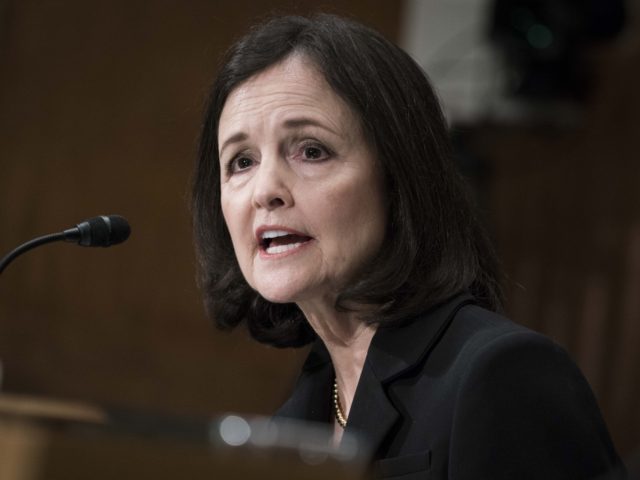Donald Trump’s attempt to secure a place for Judy Shelton on the Federal Reserve’s board of governors failed to pass a key procedural hurdle Tuesday.
The Senate voted down a measure to limit debate on the nomination of Judy Shelton to the Fed board, a crucial step to bringing her nomination to an up or down vote on the Senate floor. The vote could indicate that Republicans have failed to secure enough support to confirm the controversial nominee.
Three Republican Senators—Susan Collins of Maine, Lamar Alexander of Tennessee, and Mitt Romney of Utah—have already said they would not vote to confirm Shelton. All Democrats are expected to oppose her confirmation, an unusual partisan split over a Fed nomination, and voted against the procedural move on Tuesday.
Senator Alexander wasn’t in Washington to vote Tuesday due to a family matter. Senator Rick Scott of Florida and Senator Chuck Grassley of Iowa, are quarantining after possible exposure to the coronavirus and could not vote.
McConnell moved to preserve his right to bring Shelton’s nomination up for a vote at a later date, so her nomination is not yet dead.
Shelton, a longtime friend of White House economic adviser Larry Kudlow, has become a lightning rod for controversy and attracted opposition because of her heterodox views on monetary policy. She was long an inflation hawk, favored a tight monetary policy, and supported return to a stringent gold standard, a view out of favor with most monetary policy experts today and very different from the looser monetary policy advocated by President Trump.
Her critics also describe her recent shift away from pushing for a tight monetary policy as a ploy to put herself more in sync with President Donald Trump’s monetary policy preferences—a change they say threatens the Fed’s independence and displays unbecoming opportunism.
In truth, Shelton would have a single vote on the seven-member board of governors. That would make her unlikely to effect big changes, especially so given her unorthodox views, much less threaten Fed independence.
Supporters of Shelton cite her unorthodox views as a reason to bring her on to the Fed’s board of governor, saying it would increase the intellectual diversity of the central bank. Most Fed officials now find themselves largely in agreement about the stance of monetary policy and even extraordinary measures such as direct lending. The Fed’s huge bond purchases are not considered controversial by any sitting Fed governors. Shelton’s supporters say this kind of “group think” is risky and expect she would question the effectiveness and safety of some of the Fed’s novel economic programs and asset purchases.
“There’s the feeling we need someone from outside the monetary policy establishment on that board,” a person familiar with thinking inside the White House said.
Some of President Trump’s biggest supporters have quietly voiced concerns that Shelton has also expressed opposition to trade tariffs and sympathy for global or international currency standards that economic nationalists see as threats to U.S. sovereignty. Shelton also penned an op-ed in 2000 with the title “North America Does Not Need Borders,” a position which many think make her nomination an odd fit for a president whose most famous campaign promise was to build a wall on the U.S. border.
At her Senate committee hearing in February, Shelton said that she did not advocate going back to a “prior historical monetary arrangement” but looked to the history of the gold standard for insights applicable to today.
“Money only ever moves forward,” she said.
On Tuesday, Shelton’s nomination, however, did not.

COMMENTS
Please let us know if you're having issues with commenting.